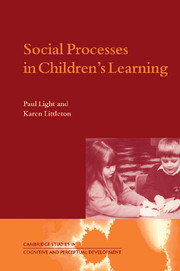Book contents
- Frontmatter
- Contents
- List of figures
- Preface
- Acknowledgements
- 1 Peer interaction and learning: perspectives and starting points
- 2 Peers and puzzles: a first series of studies
- 3 Computers and learning
- 4 Kings, Crowns and Honeybears: a second series of studies
- 5 Gender agendas
- 6 Social comparison and learning
- 7 Interaction and learning: rethinking the issues
- References
- Index
- Cambridge Studies in Cognitive and Perceptual Development
6 - Social comparison and learning
Published online by Cambridge University Press: 22 September 2009
- Frontmatter
- Contents
- List of figures
- Preface
- Acknowledgements
- 1 Peer interaction and learning: perspectives and starting points
- 2 Peers and puzzles: a first series of studies
- 3 Computers and learning
- 4 Kings, Crowns and Honeybears: a second series of studies
- 5 Gender agendas
- 6 Social comparison and learning
- 7 Interaction and learning: rethinking the issues
- References
- Index
- Cambridge Studies in Cognitive and Perceptual Development
Summary
Social comparison and ‘social loafing’
The study of processes of social comparison has been central to social psychology but marginal to developmental psychology. However, as we have seen in the last two chapters, results of peer interaction studies seem to force issues of social comparison to our attention. This chapter begins with a brief overview of some of the relevant background literature, with a particular focus on recent research by Monteil, Huguet and colleagues in France. We shall then introduce further empirical studies which build upon Monteil's work as well as our own.
Social comparison processes bridge the gap between issues of self and the sense of personal identity on the one hand, and of interpersonal and intergroup processes on the other. At its baldest, the term social comparison simply refers to any comparison an individual might make between his or her own attributes or abilities with those of someone else. Festinger (1954) highlighted the power of social comparisons in situations where individuals have no firm objective criterion by which to judge themselves or their performance. Many of the judgements we make about ourselves are relative, and may fluctuate according to who else is available to compare ourselves with (Durkin, 1995; Gergen, 1977).
The role of social comparison processes in socialisation (in the acquisition of norms and evaluation of the self against those norms) has been the subject of some developmental research (Ruble, 1983).
- Type
- Chapter
- Information
- Social Processes in Children's Learning , pp. 73 - 90Publisher: Cambridge University PressPrint publication year: 2000
- 1
- Cited by

